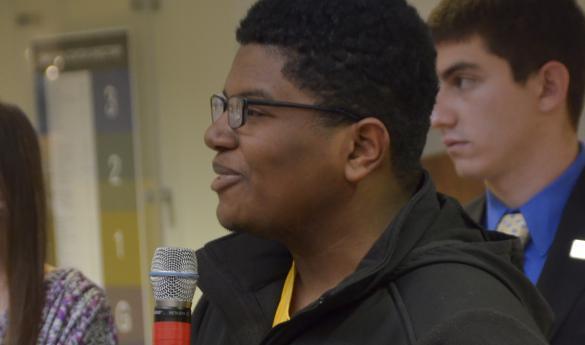Former student senator Donald Garrett to continue lawsuit against Student Government
Former student senator Donald Garrett was ordered by a judge to file an amended complaint against George Mason University’s student government.
At a hearing on September 24, Garrett was given 21 days by Fairfax Circuit Court Judge David Schell to amend his ongoing lawsuit, according to public court documents, with four of the original ten complaints that Garrett filed against student government on Aug. 16. The complaints centered around the impeachment process and his removal from the election ballot in the spring of 2012.
On March 1, the 32nd Student Senate passed Resolution 27, which ordered Garrett to be impeached and for the hearing to be held within 24 hours of passing the bill.
The resolution cited Garrett’s emails to the Election and Disputes Commission (EDC) and then-president Ally Bowers, which disputed a provision in the student election code, as cause for impeachment.
“Whereas, Senator Donald Garrett electronically via email ‘threatened’ the EDC on February 2, 2012 with his submission of suggestions for the EDC Election Code… Therefore be it resolved, that Senator Donald Garrett be impeached from his position as a Student Senator, with Impeachment proceedings taking place within 24 hours of this resolution being passed,” read the resolution.
In his lawsuit, Garrett claimed that Section 4.1 of the code, which prohibited students from running for two offices at once, violated the student government constitution.
“There is no provision in the Student Body Constitution that does not allow for a candidate to run for both [Student Senate and Executive Office],” Garrett wrote in a grievance to the EDC. “There is a clause that stipulates that you cannot serve in both a legislative and executive role. However, the terms of Senators and the Executive Branch are different.”
In his February 9 email to Bowers, Garrett advised against signing the proposed election code.
“This email is to notify you that if the Proposed Election Code passes with Section 4.1, I do plan on appealing administratively and/or legally in the court system,” read Garrett’s email. “Since you are the Chief Executive Officer of Student Government, you would be the one served.”
According to Resolution 27, the emails were classified as a threat, breached the Student Code of Conduct, and are grounds for impeachment.
Garrett resigned from his office as student senator at his impeachment hearing on March 2.
On March 18, Senator Nicholas Guerin filed a grievance against Garrett and running mate Michael Jordon on the grounds that they had started campaigning before the election period had begun. The evidence, which was cited in the grievance, included screenshots of Facebook photos with an M, a peach and a D. The EDC found Garrett and Jordan guilty of violating Election Code 5.24 on March 22, and barred them from running in the spring 2012 election. Garrett and Jordan filed an appeal to the Faculty Review Board and the board sustained the previous motion by the EDC.
In his original lawsuit, Garrett filed a complaint against student government with ten counts. According to the documents, the counts included lack of due process in the impeachment, meaning that he was not given enough time to prepare his defense, impeachment in bad faith, where Garrett claimed that reasons outside of Resolution 27 were cited for why he was impeached, defamation per se and intentional infliction of emotional distress. The lawsuit, which was officially filed against Student Senate, called for injunctive relief against Student Government; declaratory judgment that Resolution 27 is deficient and that giving notice of legal action is not call for impeachment; and monetary judgment for Garrett.
In early September, Student Government filed a demurrer, testing the sufficiency of the complaint’s allegations. In the filed demurrer, the five counts regarding the impeachment were argued to be moot because Garrett resigned before the impeachment hearing took place. The demurrer also argued that the other counts did not plead a cause for legal action.
“Garrett can have no complaint as to the conduct of the impeachment matter,” read the demurrer. “His voluntary resignation before the hearing on the impeachment . . . prevented any action by any portion of the Student Government to remove Garrett from office. Because Garrett voluntarily removed himself from office, he has no wrong to complain of as against the Student Government, and Counts I and V should be dismissed as moot.”
Garrett then filed a response to the demurrer, asking for the court to overrule Student Government’s demurrer on all counts.
At the September 24 hearing, the Judge Schell allowed Garrett to amend his lawsuit, the counts that dealt with the impeachment trial, and one count about the election was also dismissed on technical ground.
“Defendant’s demurrer is sustained without leave to amend as to Count I (Impeachment Due Process), Count II (Impeachment Bad Faith), Count III (Ultra Vires), Count IV (Deficient Resolution), Count V (Independent Tribunal Bad Faith), and Count VII (Arbitrary & Capricious),” read the court order.
“I am both happy and sad about today’s ruling,” Garrett said in a press release. “I am happy that the Court is allowing me to re-file and address my claims about the Election. However, I am upset that the Court has ruled that my impeachment claims are moot.”
“Do to continuing litigation I cannot participate in any story related to Donald Garrett,” Alex Williams, student body president, said in an email. It is common university policy to not comment on ongoing litigation.
The next trial for Garrett will be January 23, 2013.
C2M Deputy News Editor Frank Muraca contributed to this story.

